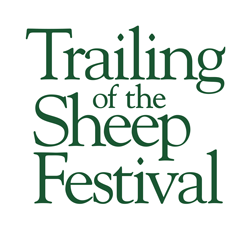The Festival Board of Directors is a nine-member group of volunteers that meet monthly to provide governance for the ongoing planning and execution of the Festival and all of its activities, while assuring that this work continues to be mission-driven.
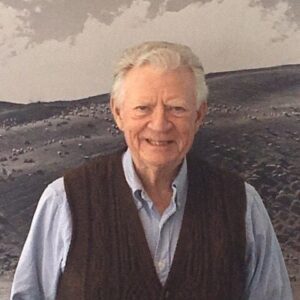
Jerry Seiffert
President
Originally hailing from Minnesota, Jerry worked summers on the Great Northern Railroad in western Montana and, “just never got the West out of his system.” Permanently moving to Idaho in 1971, he has never looked back. His professional career is flooded with interesting positions. He spent eight years in banking with Bank of America as a Corporate Credit Officer in their L.A. Branch’s International Division, as well as in the Caribbean in Anguilla, West Indies, as Branch Manager. He then served as Mayor of the City of Ketchum from 1975-1988, owned a western retail store and was a member of the Adjunct Faculty of the National Fire Academy in Emmetsburg, Maryland, teaching community fire planning in the 1990s. Jerry now is in sales at the Idaho Mountain Express newspaper produced out of Ketchum.
Along with the City Council, he helped restart Wagon Days in 1976, opened the Ore Wagon Museum in the early 1980s and established the city budget for the Ketchum Chamber of Commerce. For fun, Jerry has “trained horses while they trained him,” and enjoyed both the alpine and Nordic skiing showcased in our Valley. A board member since 2007 with the Trailing of the Sheep Festival, Jerry knows the importance of the nationally acclaimed Festival and how critical the participation of the community has been to its growth. He believes that events can’t happen without the staff and volunteers and they are key to our local economy and to our town thriving in the hospitality industry.
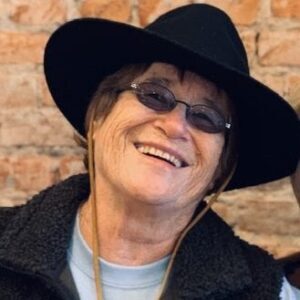
Joan Davies
Vice President
Raised on a farm in Jerome County, Idaho, Joan always had sheep. Their flock was an extremely important part of her family farm. “Truly, sheep have been a part of my entire life since childhood. That is how I learned to love them as pets on a farm and all sheep could do - like keeping us warm,” she shared.
While Joan was growing up, a man named Al Rosa and his mother brought their sheep from Pocatello to the farm next door to winter there and have their lambs. “We took pies to the herders and, in exchange, we would get bum lambs and raise them,” said Joan. “We got to know them well, they were friends and this was a cycle that happened every year. A domestic thing that happens in agriculture - globally - for thousands of years. This is part of the genius of why the Trailing of the Sheep Festival is so important to us as it brings so much education about things for all nationalities of people. This includes bringing stories from the high Himalayas to women’s stories, out to people everywhere that don’t have that opportunity to be grounded like they used to be,” she added.
After having sheep at home, doing 4H in school and then moving to Hailey, Idaho, Joan worked for the University of Idaho Agriculture Extension Service for eight years. She worked with the wool growers and learned the weighing and selling of wool. “It seems like the sheep from the standpoint of living with them, to all the practical things it takes to raise them, has been woven into my life,” Joan shared. When John Peavey was running for office, he invited members of the community - including Joan - out to trail the sheep with him. “It seemed like such a fun thing to do and it evolved,” she said. “It was a time of sharing such good stories and we all thought ‘wouldn’t it be fun to collect pictures for people coming to the event to share over coffee just like the days at the merchant building in Ketchum,’” added Joan.
She was there at the first “coffee chat” and she was there for the founding of the Festival. She helped with the educational classes, cooking classes and advertising with the team.
Joan has been the tie that binds education to the community for over two decades, working exhaustively to change the picture of post-secondary education in the Wood River Valley. For Joan, who remains deeply involved in many aspects of the community, from emergency services to chambers of commerce, getting immersed is just a part of being fully engaged in life.
Joan is still managing The Greenwood Farm (where she grew up) that her parents bought in 1929. The home she was raised in is still there, and a year-and-a-half ago, her son bought the 160-acre homestead that had been divided up and reunited the lands. Joan has three sons and with their children, all spent time on the farm. “It was a wonderful place to take kids to learn so many things. They all have pleasant memories,” she concluded.
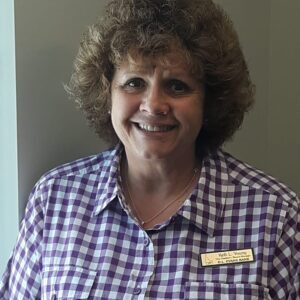
Kelli Young
Treasurer
“I was born to be a part of the Trailing of the Sheep Festival and this amazing culture!” shares Board Treasurer, Kelli Young.
Born to a Basque mother, (and the first baby girl born at the Blaine County Hospital in Hailey!) Kelli’s heritage has been passed down for generations from her grandfather, Jose (Joe) V. Lete, and his brothers. They were sheepherders in the Wood River Valley during the summers and in Shoshone, Idaho, during the winters. Kelli grew up knowing her Basque heritage and with a love of the stories of the sheep from her grandfather and his brothers. These stories were then passed on to her mother and her mother’s siblings and Kelli grew up hearing stories about nights spent in the sheep camps and learning about the foods of her culture. “Part of who I am is this heritage,” Kelli shared. “And I have that spirit and love of the sheep industry clear down to my soul,” she added.
Never having lived outside the Wood River Valley, this is the place Kelli still calls home. Her roots are here. These deep roots include remembering the stories and summers at Little Wood, her ancestors drawing the arborglyphs (writings and images on the Aspen trees) and raising her two sons (who are now raising their daughters) here. Her Basque culture is being passed down to these generations as well. “My family has all lived here, and everywhere I go, a member of my family has a story to tell about my grandfather and his stories of sheepherding,” she said. Kelli had plans to make it to the Spanish Basque country this spring – which she had to cancel due to the pandemic. But, she vows to make it there soon.
Professionally, Kelli has been in banking in the Wood River Valley for 41 years. She is happy to help people living here achieve their dreams. Kelli also believes in the importance of being a part of her community. In addition to being the Treasurer of the Festival Board, she is currently the President of the Hailey Rotary Club, serves on the Blaine County Museum Board, and is part of both the Heritage Court and Lions Club. In 2019, Kelli was chosen to receive the award for Customer Service by The Chamber of the Wood River Valley.
“I love being on the Board and part of the Festival,” Kelli said. “It gives me a feeling of home to be a part of a Board where we embrace all of the cultures that sheep is such an amazing part of here. The Festival is a great cultural experience for young and old alike, and embraces the heritage of so many ethnic groups,” she concluded.
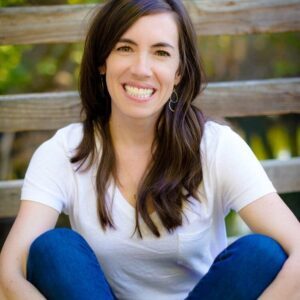
Dominique Etcheverry
Secretary
Dominique grew up in a Basque sheep ranching family in Idaho. This meant that she and her family (grandparents, parents and sister) moved every six months with the sheep. They were in one home and school from June until mid-November, and then moved locations from mid-November until the end of May. “That was the way it was because our family wanted to be together,” she shared. “It was an incredible life as we helped with the sheep. It didn’t matter our gender as we are all capable beings given a lot of responsibility—that was instilled in us and we were empowered by it,” Dominique added. In addition to she and her sister, all of the grandkids wanted to make their parents, and especially grandparents, very proud of their work ethic. Her grandfather immigrated here from the Basque country, her grandmother was the child of Basque immigrants and they wanted to do right by them for all of their hard work. “The Basque aspect and rural aspect of it all… life was fun, getting together with family and other ranching friends,” said Dominique. To this day, her dad, Henry Etcheverry, runs the ranch and “he is still having a blast,” she shared.
These days, Dominique involves herself in the ranch as time allows. She is especially involved with the lamb shippings in early and late August. She is the lamb sorter -separating the lambs from the ewes - and counting the lambs as they load onto the truck. Dominique is also the ewe wormer as the ewes are checked to ensure they are fit to breed and make it through the mountains for another year. She shares, “I love it. I started with my grandpa and dad. I am now right there with my dad and the herders.” Adding, “We all have a rapport and respect for each other and I really appreciate the opportunity to work with the herders.”
Professionally, Dominique runs both a graphic design business and an energy healing practice. Her graphic design work has involved agricultural clients as well as work with the American Lamb Board and other sheep industry clients. “This has allowed me to marry my professional world with my true loves – the sheep industry and my family,” she stated.
Dominique’s energy healing practice started as something she was doing for family, friends and animals before establishing it as a business. As she started to feel her graphic design business shifting, she also had this changing passion for the energy healing work. “I was drawn to energy healing work and, as it was an unknown, I had to find the courage to step into it,” Dominique says. “A good friend of mine was sick with cancer for the fourth time and as I started working with him and his wife, the shift happened as this was truly beneficial. Something was holding my hand along the way and I was following,” she added.
It may not seem like graphic design work and energy healing are closely related. But, Dominique says there is cross over as they both require intuition. She states, “You have to understand your client at their core and they might think they know what they want, but you need to get to know them.” Dominique has the gift of intuition and works with a lot of animals, even the sheep and the herds. Her dad will ask her at times to do work with the animals. “It all comes back to my roots,” she said.
Dominique finds it a rewarding opportunity to be on the Festival board as this is a way she can contribute to the sheep industry and ensure people are educated and this way of life is recognized. “I would say what has been such a pleasant surprise is that the sheep industry is being celebrated by thousands of people from all over the nation and the world,” Dominique says. “It is an honor to be a part of it all and work with the people who are sharing their time, talent and creativity. It feels like I am honoring my family’s heritage through this,” she concluded.
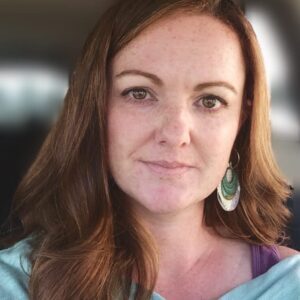
Josi Barinaga
Josi is the newest member of the board of directors, joining in February of this year. The granddaughter of an Idaho sheep rancher on her mother’s side, and great-granddaughter of Wyoming homesteaders/sheep ranchers on her father’s side, Josi grew up with a small herd of about 20 ewes in Kuna, Idaho, when it was an agricultural town. That small flock was enough to teach her how it all works. Her mom was a weaver and their sheep were mostly raised for meat. “We would shear and put the wool in old style giant bags to sell if wool prices were high enough that year… I was taught livestock management skills from a young age,” she recalls. Josi showed sheep with 4H starting at age eight and continuing through high school. She also became involved in the Basque community as a dancer and accordion player with Boise'ko Gazteak as well as an Oinkari Basque Dancer. “I saw how closely bound the Basque culture and sheep ranching are in Idaho and think it is such a vital part of the state’s history and economic importance to advocate and educate on how important it is,” Josi said.
Josi’s favorite thing about the sheep is lambing. “Like with all livestock, it is really exciting to watch them be born, learn how to help the ewe if needed, and, of course, the lambs are so fun,” she shared. Growing up with sheep creates the opportunity for many stories. Josi can still recall the first bum lamb she helped named Ashes. “In first grade, I took him in for show and tell and all of my classmates got to help bottle-feed the lamb. This is still memorable and I have a very poorly drawn picture to commemorate it,” Josi said. Her parents taught her the importance of sharing where food and textiles come from and she learned as a young girl to support and value this.
After several years away from Idaho for graduate school, Josi now lives in Inkom, Idaho, (outside of Pocatello, Idaho) 5,700 feet up on the side of a mountain. She says, “We are trying to figure out how to have sheep here amongst all of the predators. I haven’t had sheep for a long time but can’t imagine raising my 18-month old daughter Neva without sheep as it just wouldn’t seem complete.” She goes on to share that, “My husband never had even had a pet before our dog, but he is excited about livestock!”
One of she and her husband’s current projects is having recently purchased a replica sheep camp built by a finish carpenter. It is more modern and a-typical of original camps as it features cedar drawers, a canvas top and a queen-sized memory foam bed, but is still to the specifications of a genuine sheep camp. They brought it onto their property and now rent it out as an Air B&B. “This is a way to share a part of history and people are excited about being in the ‘Old West,’” she says. Adding, “We meet and greet our guests to show them around the land, tell them about the wagon, share the story of the 2,000 sheep and the herder that come near the house every year, and answer questions. We provide coffee and fruit in the morning but they are really then on their own to have a truly rustic experience.” It has been rented nearly every night since they opened. “We didn’t understand how much of a destination it would be,” said Josi. “People’s imaginations are stoked and they look at the wagon and their eyes light up,” she shares. They do not think the popularity of this attraction and unique getaway is pandemic related, but more of a generational need. She says, “The younger generations want a connection with their past and history of the area and this is one way they can do it.”
Josi made her way to the Festival Board through her friend and fellow Festival Board member, Dominique Etcheverry. Although it would seem they should have crossed paths with both of their families’ ties to the Basque culture and the sheep industry, they were destined to meet when Dominique was the graphic designer for a book Josi’s father was writing. They hit it off and now the families are tight friends. “I had been involved with the Festival as a performer, but after returning to Idaho, I was reminded of what a great opportunity the Festival was to share the different aspects that make Idaho and ranching so unique.” said Josi. "I'm grateful to be a part of this Festival and keeping the traditions alive."
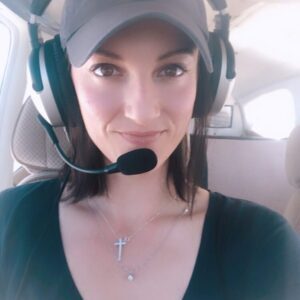
Rachel Evenson
Rachel’s roots in the sheep industry run deep. Her paternal great grandfather, Martin Espil, emigrated from the Basque country in 1897, finding his way to Winnemucca, Nevada, as a sheep herder, eventually running his own sheep operation which is still running today. Her great grandparents met in Reno, Nevada, and though they grew up in the same Basque region in France, it took moving to America to meet. The history and pride that comes from learning about those who came before her, and what they overcame to build what the family has today, helped shape Rachel into the woman she is today. She has a deep interest in the history and preservation of the sheep ranching way of life. Always a child of the outdoors and a lover of animals, Rachel has been heavily involved in all aspects of the family business since childhood. As a little girl, she would often be the first one up in the house, rising with the sun, sneaking out of her bedroom window, and going out to play with the ranch dogs, chickens, baby goats and lambs in the spring. Not much has changed as she still rises with the sun, though now it is to fly airplanes instead of play with baby lambs. Rachel and her husband now live in Caldwell, Idaho, and while the family operation is in Nevada and California, she still goes home as often as possible to work and fly her dad’s airplane for the ranch.
The history of sheep ranching has always been important to her, with a deep connection to the heritage of her family’s range sheep business. From trailing sheep, to marking lambs, shearing and summering in the wilderness of Northern California, Rachel loves to be a part of it all and believes that these traditions should be cherished and preserved for future generations. Though times are changing and the sheep industry inevitably has to evolve with them, the way of life of being a western sheep rancher is an integral piece to not only the communities that they support, but to the preservation of the West’s forests and range lands.
After nearly a decade away from northern Nevada, graduating college and pursuing a career in corporate merchandising and marketing, Rachel relocated back home to work for the ranch and fulfill her dreams of becoming a professional pilot. A life spent behind a desk just wasn’t the place for a girl who loves the outdoors. In pursuit of her commercial pilot’s license and Flight Instructor ratings, Rachel moved to Caldwell where she met her husband, a commercial pilot himself, flying helicopters and as an airline Captain. The couple now fly helicopters and airplanes as much as they can, both flight instructing and enjoying flying the beautiful Idaho back-country. Rachel is an active flight instructor, specializing in tail-wheel operations, and is well on her way to finishing her commercial helicopter license with her husband as her instructor.
Rachel was introduced to the opportunity to be a Festival board member through her friend and fellow board member, Dominique Etcheverry. Dominique and Rachel’s dads have been long time friends, though Rachel and Dominique didn’t get to know each other until recently. Another fun connection is to board member Josi Barinaga as Rachel knows Josi’s father, Dick Williams, who is one of the premiere back-country pilots in the industry. Last spring, Rachel had the opportunity to stay with Dick and his wife Linda in Salmon, Idaho, getting some valuable flight training time with Dick in her dad's super cub and getting to enjoy the hospitality of such kind people. The opportunity to be a part of something so iconic and historical as the Festival is so exciting and Rachel feels blessed to be involved in the continuation of such a wonderful event.
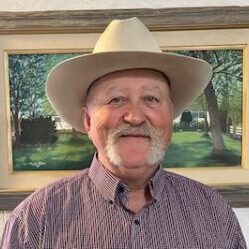
Larry Jewett
Larry, a proud fourth-generation Idahoan, was born in Mountain Home and spent his formative years on a cattle ranch in Bruneau. A graduate of Rimrock High School, Larry furthered his education at the Homebuilder Association Carpenter School, showcasing his commitment to professional development.
In 1978, Larry and his wife relocated to Mountain Home, where they raised their three children and, in 2001, they established a successful sheep ranch. They raise registered Hampshire, Dorset, and Dorset Advantage breeds. Larry is an active member of prominent industry associations, including the Idaho Wool Growers Association, American Hampshire Sheep Association and Continental Dorset Club. Larry is also a lifetime member of the Rocky Mountain Elk Foundation, demonstrating a commitment to environmental conservation.
Professionally, Larry has demonstrated his leadership as a Project Manager and Construction Superintendent at a Mountain Home construction company. Larry's community involvement is extensive. Serving as the Chairman of the Mellon Water District Board, he participated in securing grants and loans for a central water system benefiting approximately 90 families. Larry's decade-long tenure on the Elmore County Fair Board reflects his commitment to community development. As a board member and chairman, he was involved in various projects, including the renovation of livestock barns, improvements to the exhibit hall, and the construction of a small animal barn—all accomplished within budgetary constraints. Larry is currently serving as a Mountain Home Rural District Fire Commissioner, a position he has held for 29 years. He has assisted in the procurement of fire trucks and firefighting apparatus while expanding the fire station without additional tax burdens.
In addition to his professional and civic contributions, Larry and his wife have dedicated over 23 years to the Elmore County 4-H. Actively involved in the Rowdy Wranglers 4-H Club, they sell 4-H Market show lambs and have showcased their sheep at the Western Idaho Fair for 18 successful years. Larry's commitment to youth mentorship is evident in his involvement with 4-H activities, from volunteering time for barn remodeling to participating in fundraising events like the dunking tank. Proficient in managing diverse groups and adept at working within budgetary constraints, Larry brings valuable experience to collaborative projects. His ability to build relationships with subcontractors, partners, vendors, and stakeholders underscores his capacity to manage projects and address challenges effectively. He joined the Trailing of the Sheep Festival Board of Directors in 2024.
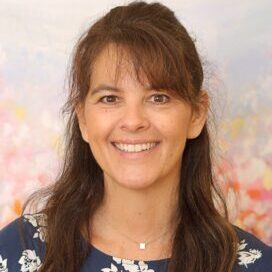
Shawn Myers
Shawn Myers brings a wealth of local heritage and passion for community to her role as a board member for the Trailing of the Sheep Festival. As a fifth generation native of the Wood River Valley (on her father's side), and with her maternal roots tied to the Basque Country of Spain, Shawn's connection to the Valley runs deep. Having also raised her children in the Valley, Shawn's family shares a profound love for the area. Alongside her commitment as an elementary school teacher at Syringa Mountain Charter School in Hailey, Shawn's involvement in the Trailing of the Sheep Festival reflects her dedication to preserving and celebrating the rich cultural and historical tapestry of the Valley. With Shawn's blend of local insight and her passion for education, she strives to ensure the Festival stays vibrant and connects with everyone, from locals to visitors alike. Shawn joined the Festival Board in 2024.
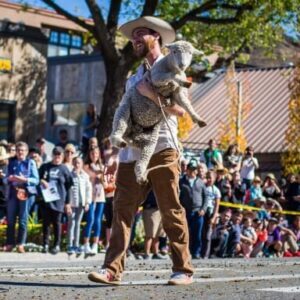
Cory Peavey
Cory sums his life up very clearly, “My work life and my personal life are one in the same,” he says. Having adopted the lifestyle of a sheepman, a life he never thought he would have, Cory finds himself busy year-round with this seven-day-a-week, unrelenting job. When it lightens up a bit in January and February, he looks forward to the little bit of quiet time to himself and to travel. He talks of the business of ranch-life as they are usually short-handed and one can never get it all done. “But, you keep doing what you can every day,” Cory states. “This year was exceptionally challenging because half of our trained help were stuck in Peru.” Now the fifth-generation rancher in his family, Cory says that when he was really young, he wanted to be everything his dad was – wearing cowboy boots, a cowboy hat, riding the horses and doing “cowboy and sheep things.” He goes on to say, “Gradually, I came to associate living on the ranch with the fact that I couldn’t play baseball with friends, go to the movies or grab a milkshake. In retrospect, though, I learned a lot of life lessons, a work ethic, agriculture and the life it provides,” he added.
In college, Cory studied to be a writer and an artist and thought it was his calling. After academia though, he thought it necessary to take a break to help the family ranch…and he has been there ever since. He says, “I may have needed to do it at first. But gradually, I learned that if I wasn’t going to do it, no one else was going to do it and I want to carry the torch to save my family’s heritage before another good sheep family disappears.”
Cory has been doing it long enough now that, he says, it becomes you. “I am at that point where it would be inconceivable for me to pick up and start over again and I can’t see myself walking away from this - the animals, the dogs, the guys that work for us…as it is my home and my family.”
Recently out with 2,100 ewes in Carey, Idaho, Cory reflects on the fact that since graduating with a creative writing degree, he has written little to nothing. But, he believes he is putting creative energy and motivation into bringing the ranch and the sheep life forward with today’s new challenges which require fresh ideas. He says, “I hope that at some point soon, I will find the discipline to write my story.” Lately, however, a lot people are coming out to do it for him. He is currently working with a documentary film crew on a piece about the sheep ranching industry.
In addition, Cory is at the forefront of the complex and rich story of socializing the guard dogs primarily trained to protect the sheep from predators. It began a few years ago when he brought a litter of puppies and their mother out Corral Creek just north of Sun Valley. He had them in the corral with his camper nearby, and was conditioning the litter to get used to tourists and bicyclists by socializing them a bit. One day, he went into town for groceries and a tourist came by, took pictures and posted the untruth on Facebook that someone had left a “starving and emaciated litter and their mom.” Cory was able to get a hold of these tourists, brought them out, let them interview him and meet the puppies, which ultimately changed their impression entirely. What ensued were positive posts about his project. Cory says, “I have seen how malicious and misleading social media can be in instances like this in not painting the whole picture. I decided that if we wanted to show things as they really are, I needed to educate the public in an appropriate way by being transparent, going public and being interviewed.” This may seem like a lot of extra effort, but Cory believes it is necessary for the image of the industry as a whole. Since 2015, Cory has socialized five litters of Great Pyrenees and Pyre Mastiffs with great results. “I now have nine really happy, healthy, working guard dogs who are all socialized…but one is always a new project!”
Cory joined the Festival Board in 2018. “The more I have been working with the sheep and in this industry, the more I realize the Festival is essential for the community to have an understanding of this life, where wool, fiber, and lamb come from, the people behind the scenes, the hardship and the history,” he says. “It is so relevant and so beautifully captured by the Festival and I am now proud to be a part of it…not just because my grandparents started the Festival but, I see a purpose in it,” he concludes.
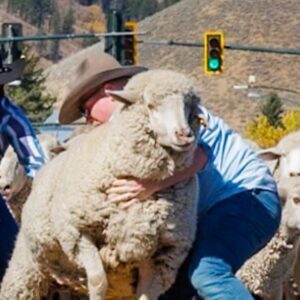
Jacob Peavey
Jacob grew up on the Flat Top Sheep Company ranch, where he looked up to the examples set by his grandfather John Peavey, father Tom Peavey, and brother Cory Peavey. From the young age of six, he became immersed in the ranching lifestyle, beginning with trailing cattle from the family’s winter farm grounds to their northern mountain ranges. This five-day cattle drive marked the beginning of a lifelong journey in ranching, where he would spend years working as a ranch hand, fixing fences, feeding cattle in the winter, and moving sheep during the early mornings.
At age 17, Jake sought to broaden his horizons beyond the ranch. He worked on the Middle Fork of the Salmon River, where he connected with people from all over the world. This experience sparked his passion for travel and, after a few years as a “swamper” on the river, he earned his guide license and spent two more years guiding rafting trips.
Jake's journey then led him to firefighting, where he worked for the Bureau of Land Management for five years. His firefighting career took him across the West - from the high deserts of Idaho and the forests of California, to the peaks of Colorado and the sweltering heat of Arizona. Along the way, he forged lifelong friendships and met his wonderful wife. However, the demands of firefighting began to take a toll, as he faced burnout and the strain of being away from his family for long stretches of time.
Deciding to return to his roots, Jake came back to the Flat Top Sheep Company. And now, alongside his wife, he spends spring through fall on the main ranch, where they enjoy the quiet, clean mountain air, the freedom for their dogs to roam, and the comfort of returning to their own private world. Jake continues to embrace the ranching lifestyle, finding fulfillment in the peace and connection it offers. He joined the Festival Board of Directors in December 2024.
(Photo credit to Jason Porter/Idaho Fine Photography)
